(Updated at 4:45 p.m.) Local elected officials, including Rep. Gerry Connolly, gathered in Lorton on Wednesday to celebrate the introduction of 42 new electric buses to the division’s fleet.
These buses, which were funded by a $16.5 million federal grant announced in January, join the 18 electric buses already in operation. Although the division currently operates over 1,600 diesel buses, county officials emphasized that these new electric buses mark the start of a larger transition.
“I know that this downpayment is the beginning of something much larger, and that’s going to take many years for us to complete,” School Board Chair Karl Frisch told the crowd of attendees at Lorton Station Elementary School on Wednesday.
“But I’m confident with our continued activism by our students, their parents, our Moms Clean Air Force and our school board colleagues and our friends at the state and federal level that we can get there because we absolutely have to,” he continued.
FCPS has pledged to provide entirely carbon-neutral student transportation by 2035. So far, the division has reduced 38% of its greenhouse gas emissions from 2008, according to the 2022 FCPS Greenhouse Gas Inventory Report.
In January 2021, the division received its first electric school bus as part of a Dominion Energy-led initiative aiming to replace all diesel school buses in Virginia by 2030. However, the Virginia House of Delegates rejected the expansion of this program, opting instead to create a grant fund.
In March, VDOT announced it had allocated $11.3 million in federal funding to assist the statewide construction of electric vehicle charging stations.
FCPS received eight electric buses from Dominion in 2021 and secured a state grant for 10 additional buses through a settlement with Volkswagen, which had been sued for emissions test cheating in 2016.
The new federal grant funds come from the Bipartisan Infrastructure Law, signed by President Joe Biden in 2021. The grant, administered through the EPA’s Clean School Bus Program, allocates $5 billion to the Clean School Bus program which is dedicated to replacing existing school buses with zero-emission and low-emission models.
“Every day throughout the United States we’re transporting 10s of millions of students on buses, and many of those buses are anything but clean,” Connolly said during the event.
“Here in Fairfax we’ve got 1,600 school buses, and today’s a great down payment toward a movement for replacing every one of them and making sure our kids are safe and in a healthy environment but also in a vehicle that is not contributing to the environmental problem,” he added.
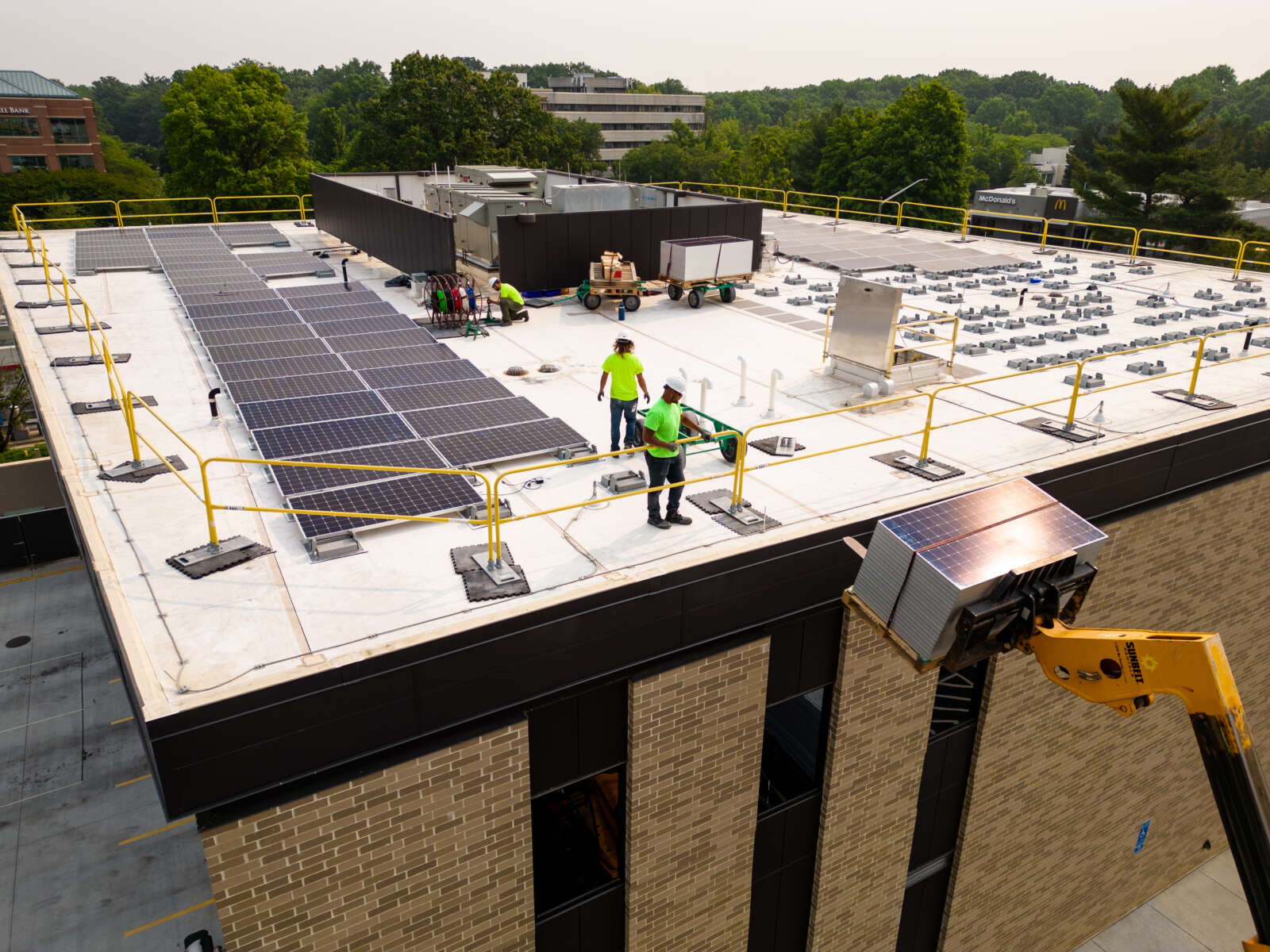
Fearing that new interconnection rules from Dominion Energy could derail its carbon reduction targets, the Fairfax County Board of Supervisors has asked Virginia’s utility regulator to step in.
In a near-unanimous vote, supervisors authorized Braddock District Supervisor James Walkinshaw on March 19 to send a letter asking the State Corporation Commission (SCC) to evaluate whether the new regulations create unnecessary hurdles for small renewable energy projects attempting to join the power grid.
Springfield District Supervisor Pat Herrity was the only abstention.
Dominion maintains that the new regulations are necessary to ensure grid reliability and the safety of field workers, but Fairfax County and other stakeholders statewide remain skeptical, contending that they make renewable energy projects more expensive and less feasible.
“In the Hunter Mill District, I have an elementary school [project] that has been complicated by this requirement,” Hunter Mill District Supervisor Walter Alcorn said. “It’s gonna be coming to the Board of Supervisors here the next couple of months, but this is creating a real impediment to doing what we need to do.”
Cost added for dark fiber lines
Dominion says it updated its interconnection requirements in response to the 2020 Virginia Clean Economy Act, which increased the capacity limit for non-residential solar developments from 1 to 3 megawatts (MW).
As a result, Virginia experienced a surge in solar, wind and other renewable energy installations that generate over 1 megawatt looking to connect to the power grid. To accommodate more and bigger energy sources, Dominion began requiring smaller energy projects from 250 kilowatts (kW) to 3 MW to install a high-speed fiber optic communication line — known as “dark fiber” or “direct trip transfer” (DTT) — between the project site and the nearest substation in 2022.
Dominion spokesperson Aaron Ruby says dark fiber is “more reliable” than cellular communication, which is prone to receiving mixed or missed signals. This could lead to unnecessary power outages if a solar facility’s power is mistakenly cut off due to a weak signal.
In addition, if there’s an emergency, dark fiber can more reliably signal the power source to turn off, ensuring line workers can fix the problem safely.
“So, this is not an issue of being ‘pro-solar’ or ‘anti-solar,'” Ruby said by email. “It’s simply about having the same basic safety and reliability standards for all solar systems that connect to the grid. The standards for medium-sized systems (i.e., 250 kW-3MW) are the same standards that apply to all of our solar facilities. These standards ensure the reliable operation of the grid and the safety of our line workers when they’re out in the field.”
Ruby noted that Dominion has one of the largest solar fleets in the country, and solar will be “by far the largest source of new power generation in Virginia over the coming decades.”
Yet, Fairfax County officials argue that no other utilities in the region place the entire cost burden of installing dark fiber lines on developers.
“Our staff has gone and looked — we couldn’t find any other utilities in the region that require this level of cost and expense,” Walkinshaw said during the board’s March 19 meeting. “So, are they necessary? Other utilities have determined that they aren’t, and as to who bears the cost, given that there are benefits both to the new interconnection and the owner of that interconnection and everyone else who utilizes the grid…we would not accept that they are all necessary.” Read More
Reston Town Center’s first solar panels are on the horizon.
Boston Properties (BXP) plans to install solar panels on top of the green garage in the town center, the property owner and developer announced Friday (March 15). The installation will feature a 1.3-megawatt solar photovoltaic renewable energy system.
“With great partners like our client and Ameresco we can transform a parking garage into a megawatt scale solar energy plant,” BXP Senior Vice President of Sustainability Ben Myers said. “This project delivers social, economic, and environmental benefits over a long term by providing zero emissions clean power, competitive energy pricing, and covered parking for clients and visitors at the Town Center.”
The project is in partnership with Ameresco, an energy developer. It’s expected to provide an estimated 1.5 million kilowatt-hours of renewable energy annually. Energy from the system will be used at Reston Town Center.
“We are thrilled to partner with BXP and their client on this exciting solar canopy project in Reston, Virgina,” Ameresco Senior Vice President Jonathan Mancini said. “By joining forces, we are building a solar solution that will empower the entire Reston community with greater energy independence and reduced reliance on the grid. This collaborative effort is a shining example of how working together can create a more resilient future for all.”
The project is expected to wrap up construction by the end of the year.
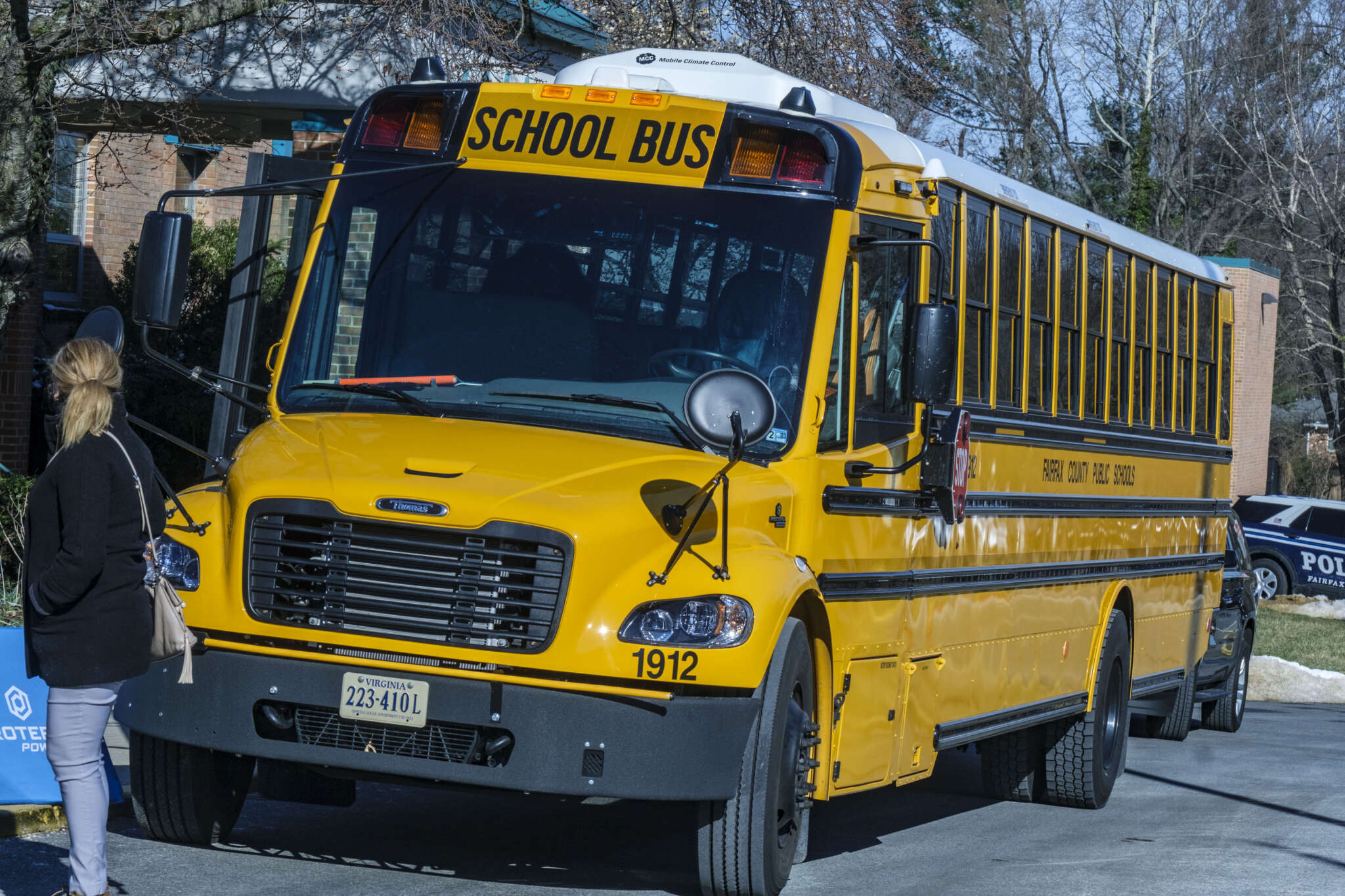
Fairfax County Public Schools will more than double the number of electric buses in its fleet, thanks to a new federal grant.
The local school system has been awarded $16.59 million as a winner of the U.S. Environmental Protection Agency’s inaugural Clean School Bus program grants competition. The other winner announced yesterday (Monday) was also from Virginia: Newport News Public Schools will receive $525,000.
The funds will enable FCPS to purchase 42 electric school buses. According to its website, the district currently has eight electric buses in a fleet with 1,625 buses, but it was slated to add another 10 in 2022. FCPS didn’t respond by press time when asked to confirm whether those buses are now operating.
“We are honored and excited to be among the recipients of the Environmental Protection Agency’s Clean School Bus Awards,” FCPS Superintendent Dr. Michelle Reid said in a statement. “This recognition not only underscores our commitment to sustainability and environmental stewardship but also reflects our ongoing efforts to provide healthier, cleaner transportation for all Fairfax County Public Schools students.”
FCPS has pledged to provide entirely carbon-neutral student transportation by 2035. The first electric school bus arrived in January 2021 as part of a statewide initiative led by Dominion Energy, which had proposed replacing all diesel school buses in Virginia by 2030.
However, the Virginia House of Delegates voted against expanding Dominion Energy’s program that spring, instead creating a grant fund that never got funding.
After getting eight electric buses from Dominion in 2021, FCPS received a state grant for 10 buses out of a settlement agreement with Volkswagen, which had been sued in 2016 for cheating on vehicle emissions tests.
The new federal grant funds come from the Bipartisan Infrastructure Law signed by President Joe Biden in 2021, allocating $5 billion to create the Clean School Bus program, which is dedicated to replacing existing school buses with “zero-emission and low-emission models.”
While FCPS intends to buy electric buses, Newport News requested funding to add propane-fueled buses, a switch it said will reduce emissions and lower fuel and maintenance costs.
Rep. Gerry Connolly called the grant “a game-changer” for FCPS.
“The environmental benefits of these new buses are vitally important to our fight against climate change, but the good news doesn’t stop there,” Connolly said. “Students, staff, and parents who spend time on and around school buses will no longer be exposed to diesel exhaust and other toxins from diesel-powered buses.”
This is a gamechanger for Fairfax County. Clean school buses will bolster our fight against climate change and protect the health of students, staff, and parents.⁰
This win comes thanks to the #BipartisanInfrastructureLaw signed by President Biden.⁰https://t.co/mcAKAvZZoH https://t.co/an33Aarx5K— Rep. Gerry Connolly (@GerryConnolly) January 8, 2024
Outside of the school system, the Fairfax County government adopted an operational energy strategy in 2021 whose targets included converting all of its buses and fleet vehicles to electricity or another non-carbon-emitting fuel by 2035.
Fairfax Connector, the county’s public bus system, welcomed its first electric buses in September, and the Department of Public Works and Environmental Services added an electric trash truck in August.
Late last year, the county launched a Climate Action Dashboard to keep track of its progress on various efforts to combat climate change. The transportation portion of the dashboard indicates that the county government has acquired 224 hybrid and 50 fully electric vehicles, putting it just 1.5% of the way to its goal of completely transitioning in just over a decade.
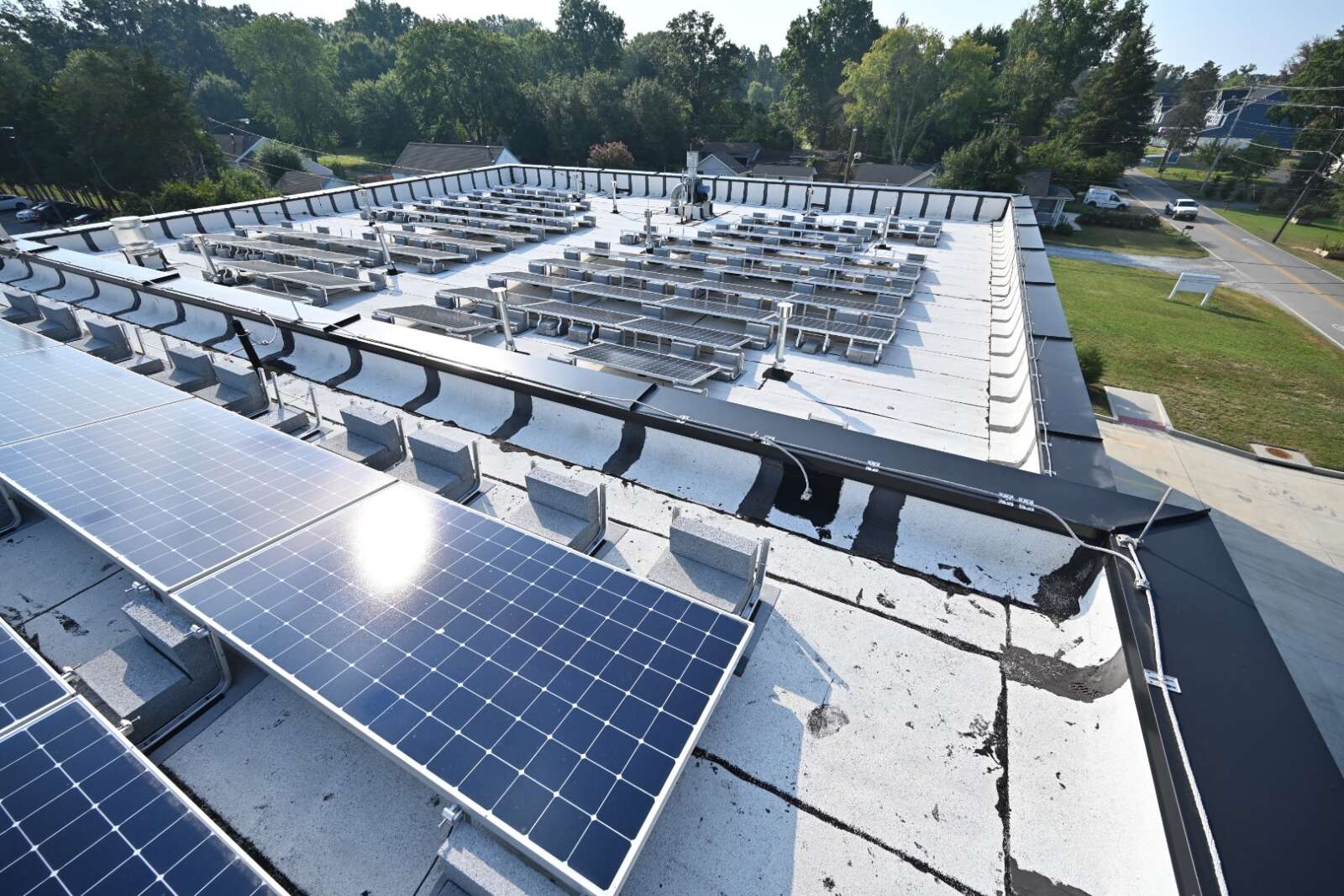
The public can get a closer look at Fairfax County’s efforts to combat climate change with an updated Climate Action Dashboard.
The dashboard updates, released yesterday (Dec. 18) by the Fairfax County Office of Environmental and Energy Coordination (OEEC), include a new interactive map and sector-specific landing pages, so community members interested in buildings, for example, can view those metrics separately ones about waste.
Overall, the updated dashboard aims to highlight how data informs county decision-making and how positive results come to be through “collective effort,” per a county press release.
So far, progress includes a 30% reduction in greenhouse gas emissions between 2005 and 2020 and an increase in solar installations.
The county has an extensive set of climate-related goals, outlined in three plans. Two of those plans — the Community-wide Energy and Climate Action Plan and the Operational Energy Strategy — focus on emissions, while the third focuses on climate resilience against natural disasters like flooding and heat.
“Resilience means being able to bounce back fully from shocks and stressors that come our way without suffering permanent loss,” OEEC acting director John Morrill told the Board of Supervisors at an environmental committee meeting last Tuesday (Dec. 12).
The county is making progress on a variety of its environmental goals, according to a high-level summary Morrill presented at the meeting.
For example, it’s ahead of where it needs to be to retrofit at least 100,000 housing units with energy efficiency by 2030, and it has surpassed a goal of increasing telework and non-motorized commuting, though the OEEC acknowledges that could “regress” as more workers return to offices after the pandemic.
In other metrics, however, the county is behind its benchmarks. Just 10% of energy in the community comes from clean sources, when it should be at 20% to reach its goal of all clean energy by 2045, and 48% of waste is being diverted from landfills or incineration, a rate that should be closer to 60% to reach 90% by 2040.
Morrill noted that the county has more control when it comes to developing resilience than when reducing emissions.
“Emissions reduction is a national and global effort, and much is beyond our control or even influence,” Morrill said. “We’ll be more clearly defining the factors beyond county control to better calibrate our efforts and expectations to ensure that we are focused on making the most of what the county can do best.”
Morrill compared climate resilience to running on a treadmill as its speed increases, and said it may not be possible to reach 100% resilience.
“Nevertheless, the county’s resilience efforts are crucial to ensuring we do not fall off the back of the treadmill, which in this metaphor would mean permanent loss of life, property and resources,” Morrill said.
At the meeting, Board of Supervisors Chairman Jeff McKay said community engagement would be key to achieving the county’s climate action goals, including its target date of 2050 for achieving carbon neutrality.
“Without their engagement and involvement, we can’t achieve these overall goals,” McKay said.
An addendum to Morrill’s presentation provided updates on several county initiatives. For example, Charge Up Fairfax — a pilot program that assists residential communities with electric vehicle charging — launched with five neighborhoods this year. Another five neighborhoods were recently added.
Fairfax County’s cooling centers, which got revamped earlier this year, had 251 visits in 2023.
The OEEC will regularly add new and more up-to-date information to its Climate Action Dashboard, according to the press release. The board will receive more detailed information about the county’s progress on its goals early in the new year, Morrill said.
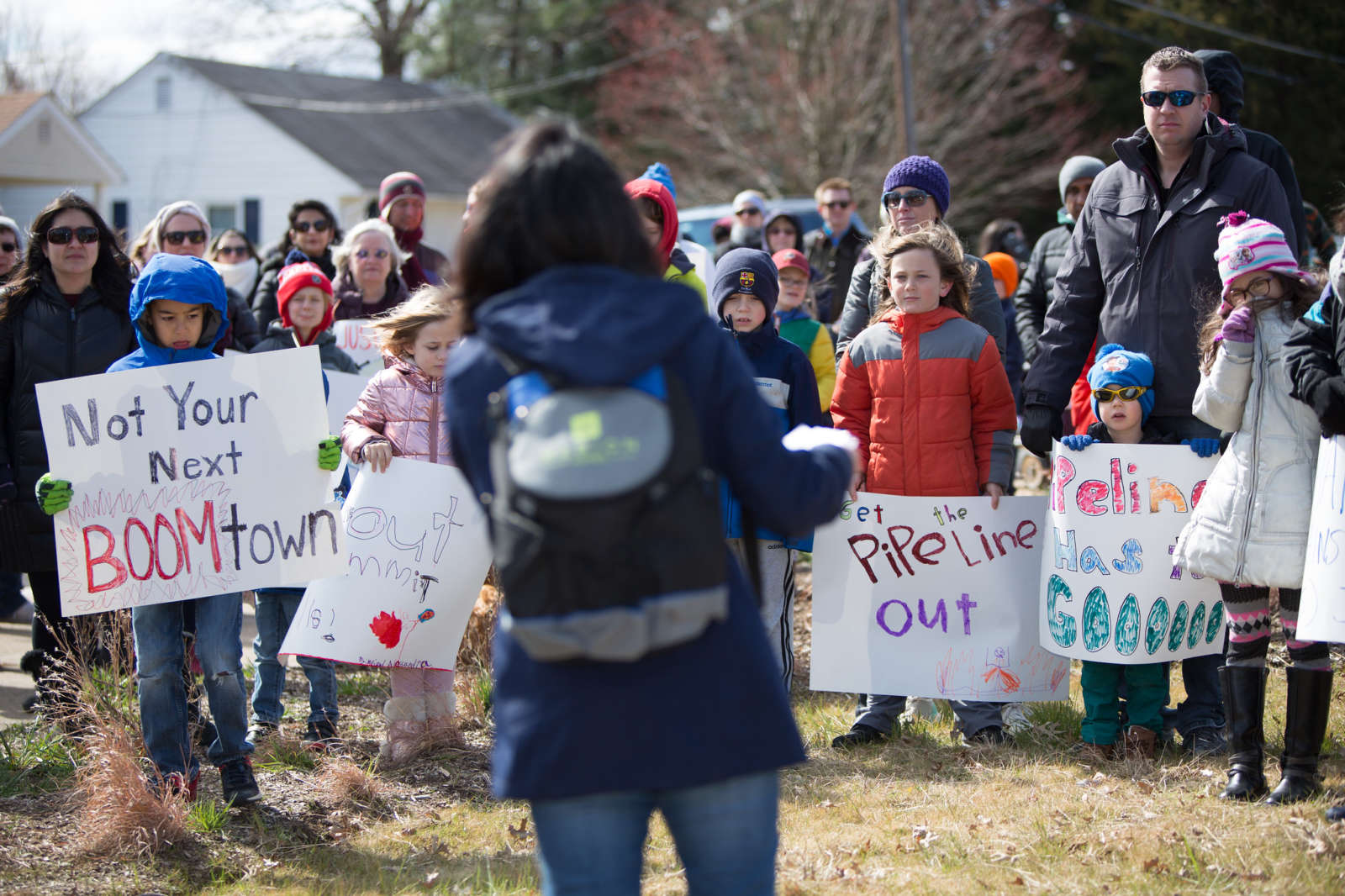
Fairfax County is exploring avenues for regulating or even prohibiting the construction of high-pressure natural gas pipelines under residential streets.
The county’s Board of Supervisors directed staff last week (Dec. 5) to evaluate options for “Board evaluation of, or possible prohibition of” gas pipelines that utilize local street rights-of-way based on their size, the type of pipe used and other operational factors.
The request was spurred by safety concerns from residents, according to Dranesville District Supervisor John Foust, who introduced the motion.
“The residents have questioned the safety and need for this type of line to be located under a local residential street, citing concerns about a higher risk for gas leaks and related hazards in the event of a rupture due to construction activities within proximity of the line,” Foust said.
While no specific project is mentioned in the board matter, which passed unanimously without discussion, Foust confirmed to FFXnow that the potential risks of having major gas pipelines under residential streets was brought to the board’s attention by Pimmit Hills residents, who have spent several years now fighting a planned pipeline through their neighborhood.
The 2-feet-wide underground line proposed by Washington Gas would replace an existing 14-inch-wide line and complete the Strip 1 Tysons project that has been in the works since 2012. When finished, the 5-mile pipeline will run from Tyco Road in Tysons to a new regulator station at the Pimmit Hills Center (7510 Lisle Avenue).
Pimmit Hills residents have rallied against the project, which they argue will endanger their homes and families. Washington Gas has said an alternative route putting the pipeline under Route 7, instead of residential streets, would be more disruptive and time-consuming.
After the Fairfax County Board of Zoning Appeals ruled in February 2022 that the project needs to get additional county approvals, Washington Gas sued the zoning board and four residents in a lawsuit that challenged the board’s authority to overrule an administrator who determined the project could proceed.
Fairfax County Circuit Court Judge David Oblon overturned the zoning board’s ruling on Oct. 12, determining that the pipeline is a distribution line and, as a result, not subject to the county’s zoning code.
“Washington Gas’ entire series of pipelines engage in the distribution of gas. They are all exempt from the Zoning Ordinance…exactly as the Zoning Administrator originally stated,” Oblon wrote in his opinion, disputing the defendants’ argument that the pipe counted as a transmission line because it doesn’t directly serve the affected properties.
The defendants have appealed the decision to the Virginia Court of Appeals and are seeking to put any construction on hold while Fairfax County develops a possible ordinance, according to Christine Chen Zinner, one of the residents. A hearing on the request for a pause is scheduled for this Friday, Dec. 15.
Kurt Iselt, another defendent and Pimmit Hills resident, says the community is “grateful” that the Board of Supervisors is looking at potential regulations after the October court ruling suggests “the clock on this ticking time bomb is running out.” Read More
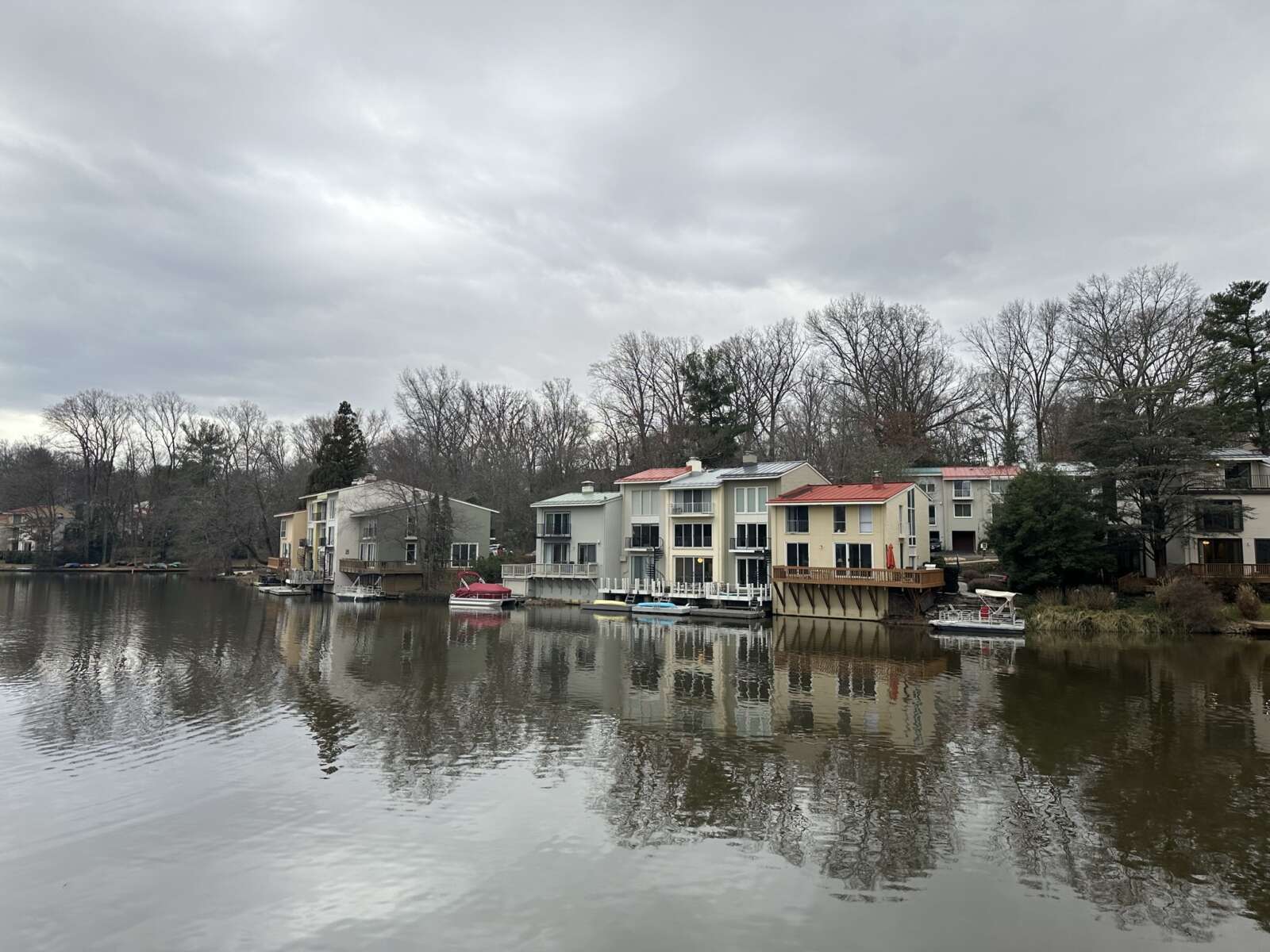
(Updated at 10 a.m. on 12/13/2023) A community-oriented utility company that offers chilled water for air-conditioning has iced out over 600 customers in Reston.
Reston Lake Anne Air-conditioning Corporation (RELAC) announced yesterday (Monday) that it plans to halt its cooling system after this year, citing increased electrical costs and the refusal of some customers to pay their utility bills.
The company concluded its 2023 cooling season on Oct. 10 and typically shuts down for the winter. Regulated by the Virginia State Corporation Commission, it uses water from Lake Anne to provide air-conditioning to homes around the lake.
A Reston Association spokesperson says the organization plans to work with the community to determine next steps.
“We will be diligently working in the coming weeks to understand the full impact of this action to best help out affected members know and understand what alternatives to RLAC exist and the role LARCA and RA have moving forward,” Cara O’Donnell said in a statement to FFXnow.
Reston has 600 residential properties and 25 commercial ones that rely on RELAC for air-conditioning, according to RA.
In the past, some homeowners have sought to end the mandated use of RELAC, complaining that the 1960s-era system is outdated and inefficient. Referendums failed in 2008 and 2015.
Here’s the full text of the company’s letter to its customers.
We, the owners of RELAC, regrettably and with great difficulty have to announce that the 2023 cooling season will be the last year that RELAC provides chilled water to our customers. We have reached this decision due to many factors including the following:
Electrical costs have increased 20% in the ten years we have owned RELAC.
We have considered applying for a tariff increase which would cost over $50,000. We believe it would hasten our customers applying for exemptions as rates would increase by up to 30%.
We did promise not to increase the tariff 11 years ago and thought we could cut costs with new equipment but found it impossible to secure a loan for a new chiller that would cost over $400,000.
Reston Association continues to grant “health exemptions” to customers without enforcing the rules returning homes to RELAC when they change ownership. We now have 33 homes off the system.
A significant number of customers on the RELAC system have refused to pay their utility bills. This has caused a serious problem for RELAC’s bottom line. The amount of unpaid utilities has fluctuated between $80K to $120K. We have sent letters, made phone calls, knocked on doors trying to reason with customers to pay their overdue bills. Some customers are years behind and we have no way of turning off their service as the other utilities do.
We have been a community oriented utility for over 50 years and understand the hardship we are generating on our customers. We know that the cost of retrofitting a new A/C system will be expensive. Leaving our good customers is the worse part of this decision and we feel a profound regret. The decision we have made is not an easy way to end our relationship with you, our loyal customers.
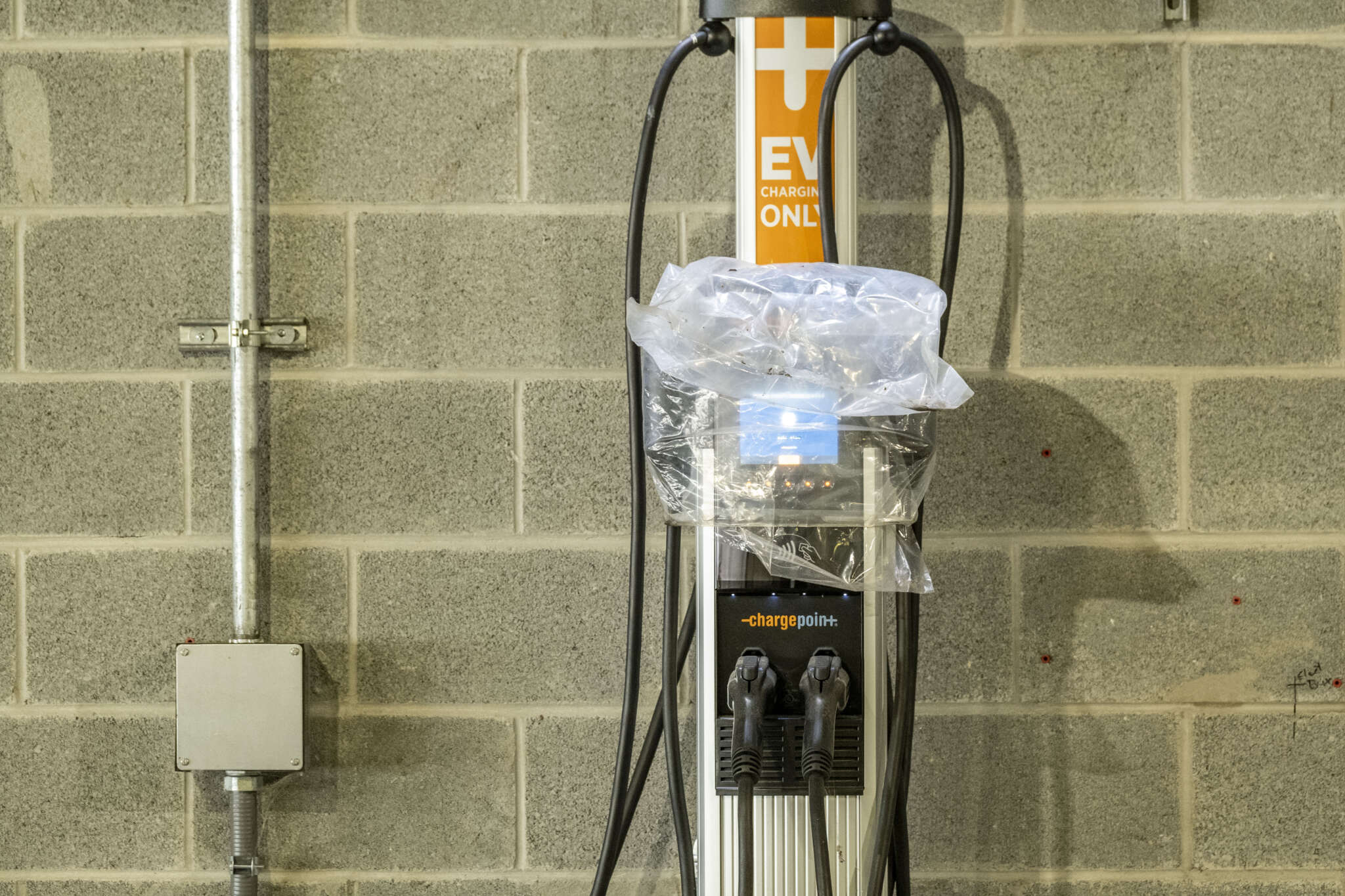
Fairfax County is ramping up its efforts to help homeowners’ associations and other resident groups bring electric vehicle chargers to their communities.
The county’s Office of Environmental and Energy Coordination is now accepting applications for the second phase of its Charge Up Fairfax pilot program, which provides technical and financial assistance to organizations looking to add charging stations in common areas.
“County staff and consultants will work with a new cohort of five common-interest (e.g. HOA) communities,” OEEC acting director John Morrill said in an Oct. 11 memo to the Board of Supervisors. “This second phase of the pilot will build upon initial participant feedback and lessons learned to bring more informed assistance to additional communities.”
The application window will be open through Nov. 12. In the memo, which was delivered to the board’s transportation committee yesterday (Tuesday), Morrill said his office hopes to launch the program at full scale next spring.
As the county pushes to expand Charge Up Fairfax, the HOAs selected for the pilot’s first phase in March are still working to get EV chargers into the ground.
Chosen out of nine applicants, including one that later withdrew from the process, the five communities were:
- Penderbrook Community Association
- Hidden Creek Homeowners Association near Burke
- Three Reston neighborhoods — Harpers Square Cluster Association, Nantucket at Reston and the Inlet Cluster Association
Prior to the pilot’s launch, Reston Association had anticipated starting installations as early as July, but as of September, none of the five participating groups have selected a contractor yet, Morrill said in the memo. Four are now discussing quotes from contractors with their boards.
“There are no further updates beyond what is documented in the memo,” OEEC spokesperson John Silcox said when asked if any progress has been made in the past month.
Though Charge Up Fairfax hasn’t resulted in any new EV chargers yet, the pilot has helped the county and HOAs learn more about the process and obstacles that residential neighborhoods face when trying to add that infrastructure.
The two top challenges that the HOAs have encountered so far are the cost of installing chargers and the limited availability of guest parking, since the stations have to be accessible to all residents and guests, Silcox told FFXnow.
Townhouse communities will soon be required to provide visitor parking in common areas after the Board of Supervisors approved new parking regulations last month that will take effect on Jan. 1.
The county is paying up to $10,000 for engineering site visits and feasibility assessments by its consultant, Vybe Energy, for each of the communities, which can also get grants to cover up to one-third, or $5,000, of their installation-related costs reimbursed. HOAs in highly vulnerable areas can get up to $10,000 reimbursed.
However, one of the HOAs has been “reexamining whether to move forward with community charging stations” or have residents install stations individually in their assigned spaces, the OEEC said. Another group is still determining how many stations it will install, and a third has put its project on hold after it had to shift funding to address “more pressing repair needs.”
In addition, two communities are working with county staff to potentially create more parking spaces that could be used for their EV chargers, according to the memo.
Despite those challenges, the OEEC says interest in Charge Up Fairfax has been strong, with 63 participants joining a Sept. 14 webinar and “dozens of individuals” signing up to receive updates.
When fully launched, the program is expected to support 15 communities annually. The county allocated $625,000 in its current fiscal year 2024 budget that will fund approximately two years of Charge Up Fairfax.
“Participants have also indicated that the program materials and the feasibility memo have been helpful with their decision-making and next steps,” Silcox said. “OEEC will continue to work closely with the pilot communities to learn what adjustments should be made to the program before it is launched more broadly in spring 2024.”
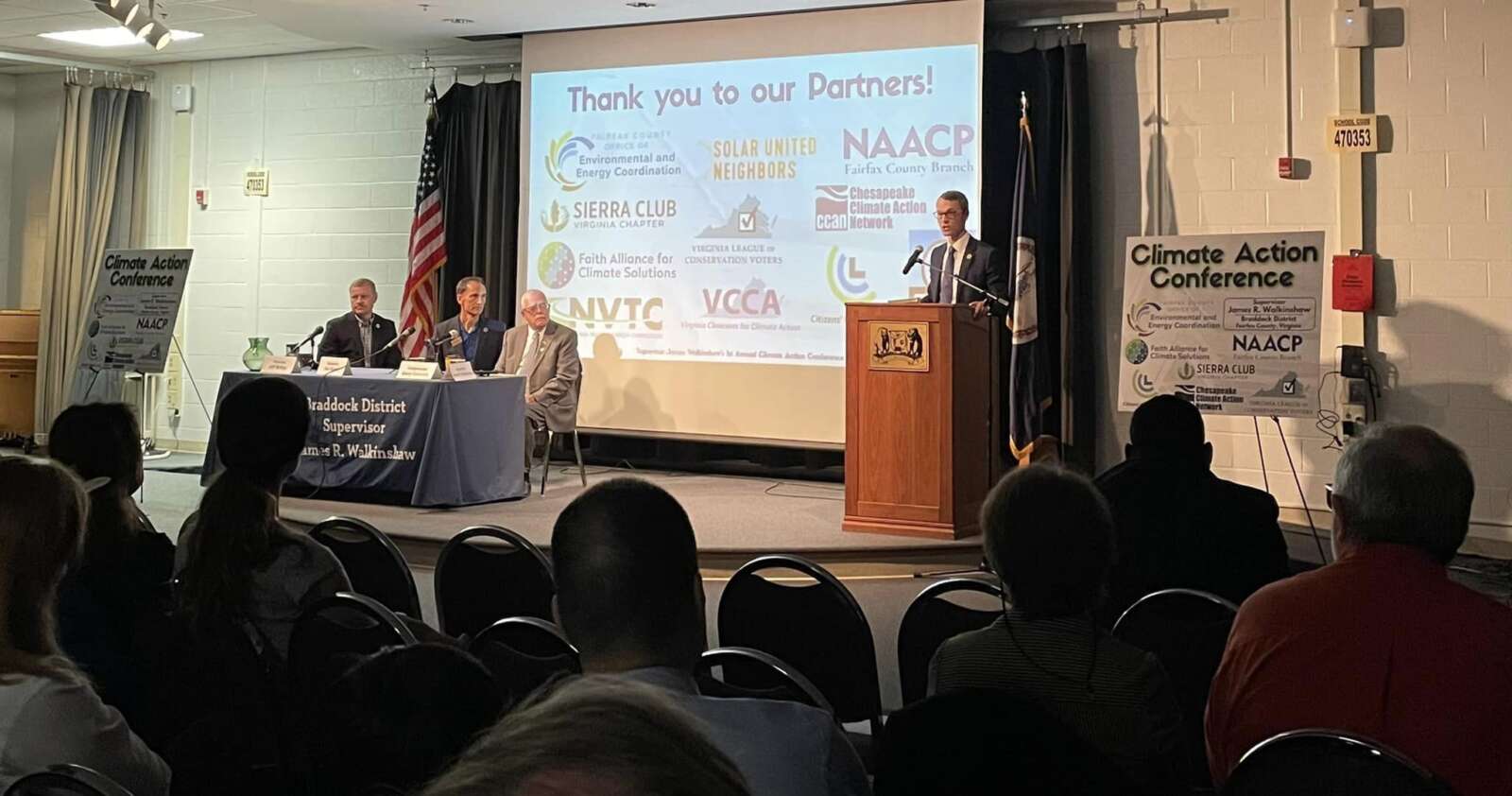
Fairfax County residents are underutilizing publicly-funded incentives to make their homes more green. That’s according to James Walkinshaw, Fairfax County Supervisor for the Braddock District, who hosted the county’s first Climate Action Conference on Sept. 30.
Greeting a crowd of community members gathered at Lake Braddock Secondary School, Walkinshaw said the focus of the conference was to give residents “all the actionable information and the tools you need to reduce your emissions and save money.”
“Whether you’re an individual, a family, a homeowner, a business leader, or a leader of a faith community or faith group, now is the time to take advantage of those opportunities,” Walkinshaw said.
Walkinshaw was joined by U.S. Rep. Gerry Connolly, Fairfax County Board of Supervisors Chair Jeff McKay and Mount Vernon District Supervisor Dan Storck.
The board members touted their record on the environment, including the hiring of 16 employees to address climate policies and piloting electric buses on both Fairfax Connector and Fairfax County Public Schools bus routes.
Sherie Cabalu, a homeowner in Vienna, came to the Climate Conference to learn about what she could do personally to combat climate change.
“I really wanted to just find out what we could do at a home level and a personal level,” Cabalu said. “You know, we hear about all the policies and everything, but how does that translate into actual, you know, doing something at the individual level?”
The event’s keynote speaker was Michael Forrester, assistant director of partnerships in the Office of State and Community Energy Programs at the Department of Energy. The mission of Forrester’s office is to share information at the community level about federal incentive programs that people can partake in to reduce their carbon footprint and save energy costs.
“We’re trying to activate local communities, and we’re trying to put these technologies in people’s homes to make a big significant difference on the nation’s carbon footprint,” Forrester said, adding, “Significant amounts of money are flowing from the federal government to local communities and to individuals’ homes.”
Low-income households can apply for the Weatherization Assistance Program, which offers home energy audits and makes necessary improvements and repairs to heating and cooling systems. The improvements are free of charge and may include work on windows and doors, roof repairs and HVAC sealing, thereby improving efficiency and lowering lower energy bills, according to Forrester.
Clean Vehicle Tax Credits are also available for Virginians to get back up to $7,500 for the purchase of a new electric vehicle, or up to $4,000 for a used electric vehicle. Restrictions apply based on the buyer’s annual income and the value of the vehicle.
Forrester also said homeowners are eligible to receive a tax credit equal to 30 percent of the cost of energy-efficient home improvements like solar panels and geothermal heat pumps. This long-term credit is part of the Inflation Reduction Act of 2022 and will be in effect for 10 years.
More incentives are coming soon to Virginians. Starting next year, Forrester said homeowners will be eligible for additional support. Under the Inflation Reduction Act’s Home Energy Rebate programs, homeowners will be able to receive up to $3,200 in additional tax credit for investment in more efficient heating systems, windows and doors. Read More
Electric buses have at last joined Northern Virginia’s largest local bus fleet.
Fairfax Connector launched the eight battery-powered vehicles out of its West Ox Operations and Maintenance Center (4970 Alliance Drive) at 10:30 a.m. last Thursday (Sept. 28), a critical first step forward in the transit system’s plan to phase out diesel or gas-fueled buses.
Supported by four newly installed, 150-kilowatt chargers with two dispensers each, the buses have 39 passenger seats and can travel up to 250 miles on a single charge, according to the Fairfax County Department of Transportation.
“Battery electric buses represent a monumental leap forward in eco-friendly transportation,” FCDOT said in a news release. “These vehicles offer a wide range of environmental benefits, including a drastic reduction in greenhouse gas emissions, a significant reduction in air and noise pollution, and decreased dependence on fossil fuels.”
Another eight electric buses are in the works as part of the new pilot program. Four vehicles currently in production will be delivered to the Huntington Bus Garage, while the other four haven’t started production yet and aren’t slated to arrive until 2025.
The initial eight buses will be deployed on six different routes, covering a wide swath of the county:
- 310: Franconia Road-Rolling Valley
- 395: Gambrill-Pentagon Express
- 901: Herndon Metro-Centreville
- 632: Westfields Blvd-Walney Road
- 463: Maple Avenue-Vienna
- 615: Fair Oaks-Greenbriar
The next eight buses will also be tested “on various routes in the coming months,” FCDOT communications head Freddy Serrano said.
The pilot is launching a little behind schedule. The county had previously hoped to have electric buses on the road by December 2022.
“Additional supply chain impacts caused by the pandemic delayed manufacturing,” Serrano said. “Also, a factory recall was issued and remedied before acceptance of the buses.”
Electric bus recalls sparked by a battery fire this spring also delayed deliveries to Metro, which is expecting 12 vehicles for the first phase of its transition plan and recently landed funds to help convert its Cinder Bed Road Bus Division garage in Franconia into a fully electric facility.
Fairfax County started exploring using electric vehicles for public transportation by piloting an autonomous Relay shuttle in Merrifield until this past June. The Department of Public Works and Environmental Services recently unveiled its first electric trash truck, and Fairfax County Public Schools has added a few electric school buses to its fleet.
While these are Fairfax Connector’s first electric buses, the agency already had several electric support vehicles, including 14 sedans and chargers at its Fair Oaks offices (4050 Legato Road) and two electric vehicles with six chargers at the Herndon Bus Garage (268 Spring Street).
“The pilot program includes several phases and is the first of many steps toward a more sustainable transit system in Fairfax County,” FCDOT transit services division chief and Fairfax Connector head Dwayne Pelfrey said. “Information obtained during the pilot program and on-going evaluation of various technologies will guide strategic decisions in the coming years as we work to build tomorrow’s transit system today.”
Pledging to become carbon-neutral by 2040, Fairfax County adopted an operational energy strategy in 2021 with goals that included halting all diesel bus purchases after this fiscal year — which ends June 30, 2024 — and fully transitioning all buses and fleet vehicles to electricity or a non-carbon-emitting power source by 2035.
Fairfax Connector has more than 300 buses that carry approximately 26,000 riders on 93 routes daily.

